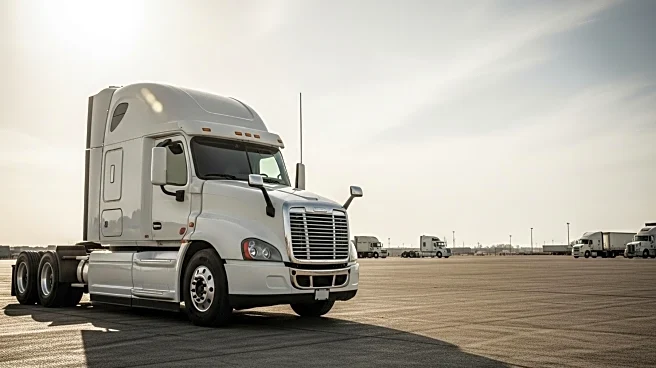What is the story about?
What's Happening?
The U.S. trucking industry, responsible for hauling approximately 11 billion tons annually and handling nearly three-quarters of the nation's freight by weight, is experiencing significant challenges. The industry is facing a retention crisis due to burnout and stagnant wages among truck drivers. Since 2023, over 30 trucking companies have filed for bankruptcy, and forecasts indicate a 'highly uncertain' future due to trade policies, weak demand, and broader economic headwinds. A survey revealed that 69% of freight businesses struggle to meet demand due to driver shortages, although experts debate whether the issue is a shortage or retention problem. Additionally, tariffs on medium and heavy-duty trucks, set to take effect in November, may increase production costs for domestic manufacturers.
Why It's Important?
The trucking industry's struggles have broader implications for the U.S. economy, as it plays a crucial role in transporting goods across the country. The retention crisis and potential driver shortages could lead to operational inefficiencies, affecting supply chains and consumer prices. Tariffs on trucks and imported materials like steel and aluminum may further increase costs, impacting manufacturers and potentially leading to higher prices for consumers. The industry's challenges could also affect small and midsized trucking companies, which may struggle to adapt to new immigration policies and technological advancements. The introduction of automation and artificial intelligence could disrupt the industry further, potentially replacing nearly half of the nation's truck drivers within a decade.
What's Next?
The trucking industry may need to adapt to new technologies, such as logistics software and autonomous vehicles, to enhance efficiency and address current challenges. The impact of tariffs and immigration policies will continue to unfold, potentially leading to higher production costs and labor tightness. Industry experts believe that despite current economic conditions, the trucking industry will survive due to its essential role in the economy. However, the transition may be difficult, with some companies facing catastrophic consequences. The survivors of this period may benefit during the next strong market, but the path forward will be challenging.
Beyond the Headlines
The potential automation of the trucking industry raises ethical and economic questions about the future of employment for truck drivers. While technology could improve efficiency, it may also lead to significant job losses, affecting the livelihoods of many workers. The industry's adaptation to new technologies and policies will require careful consideration of the social and economic impacts, as well as strategies to support affected workers.















